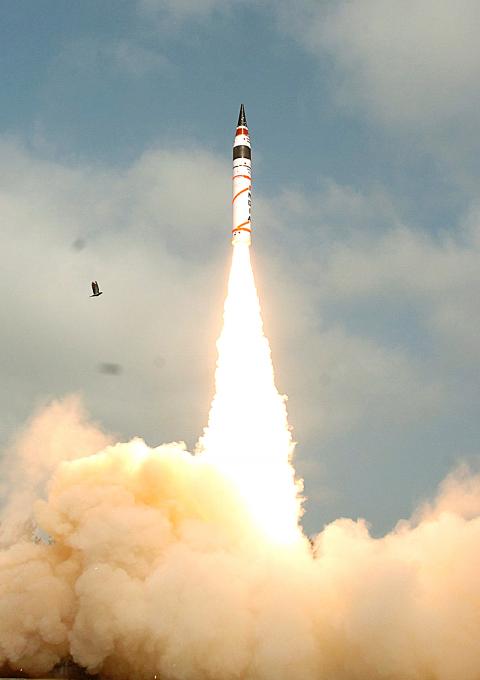India yesterday announced the successful test launch of a new nuclear-capable missile that would give it the ability to strike the major Chinese cities of Beijing and Shanghai, a significant step forward in its aspirations to become a regional and world power.
The Agni-V missile, with a range of 5,000km, still requires a battery of tests and must clear other bureaucratic hurdles before it can be inducted into India’s arsenal in a few years. However, officials hailed the launch as proof that India has taken its place among the world’s most powerful and scientifically advanced nations.
“The nation stands tall today,” Indian Defense Minister A.K. Antony said, according to the Press Trust of India.

Photo: EPA
China is far ahead of India in the missile race, with intercontinental ballistic missiles capable of reaching anywhere in India. Currently, the longest-range Indian missile, the Agni-III, has a range of 3,500km, which falls short of many major Chinese cities.
“At the moment there is a huge assymetry in China’s favor,” said C. Uday Bhaskar, former head of the Institute of Defense Studies and Analyses.
After it adds the missile to its arsenal, however, “India’s deterrent profile in the region would be appropriately burnished,” he said.
Video released by the government showed the Agni-V taking off from a small launcher on what appeared to be railroad tracks at 8:07am from Wheeler Island off India’s east coast. It rose on a pillar of flame, trailing billows of smoke behind, before arcing through the sky.
The missile hit an altitude of more than 600km, its three stages worked properly and its payload was deployed as planned, Defense Research and Development Organization head Vijay Saraswat told the Times Now news channel.
“India has emerged from this launch as a major missile power,” he said.
The missile will need four or five more trials before it can be inducted into India’s arsenal at some point in 2014 or 2015, Indian officials said.
Chinese Ministry of Foreign Affairs spokesman Liu Weimin (劉為民) declined to discuss the launch at a regular news conference yesterday, saying only that India and China should work together as strategic partners.
However, a state TV report on the launch enumerated the missile’s shortcomings and a Chinese newspaper warned India not to get arrogant and overestimate its strength.
“India should be clear that China’s nuclear power is stronger and more reliable. For the foreseeable future, India would stand no chance in an overall arms race with China,” said an editorial in the Global Times, which is published by the Chinese Communist Party’s official mouthpiece the People’s Daily.
China also said yesterday that upcoming joint war games with Russia were not organized in response to India’s successful ballistic missile launch and were instead aimed at upholding regional peace.
According to the Chinese defense ministry, the two neighbors will hold joint naval exercises in the Yellow Sea off the coast of the eastern port city of Qingdao from Sunday to Friday next week.
“This joint military exercise is a long scheduled one between China and Russia in order to uphold regional peace and stability,” Liu told reporters.

MAKING WAVES: China’s maritime militia could become a nontraditional threat in war, clogging up shipping lanes to prevent US or Japanese intervention, a report said About 1,900 Chinese ships flying flags of convenience and fishing vessels that participated in China’s military exercises around Taiwan last month and in January have been listed for monitoring, Coast Guard Administration (CGA) Deputy Director-General Hsieh Ching-chin (謝慶欽) said yesterday. Following amendments to the Commercial Port Act (商港法) and the Law of Ships (船舶法) last month, the CGA can designate possible berthing areas or deny ports of call for vessels suspected of loitering around areas where undersea cables can be accessed, Oceans Affairs Council Minister Kuan Bi-ling (管碧玲) said. The list of suspected ships, originally 300, had risen to about 1,900 as

Japan’s strategic alliance with the US would collapse if Tokyo were to turn away from a conflict in Taiwan, Japanese Prime Minister Sanae Takaichi said yesterday, but distanced herself from previous comments that suggested a possible military response in such an event. Takaichi expressed her latest views on a nationally broadcast TV program late on Monday, where an opposition party leader criticized her for igniting tensions with China with the earlier remarks. Ties between Japan and China have sunk to the worst level in years after Takaichi said in November that a hypothetical Chinese attack on Taiwan could bring about a Japanese

MORE RESPONSIBILITY: Draftees would be expected to fight alongside professional soldiers, likely requiring the transformation of some training brigades into combat units The armed forces are to start incorporating new conscripts into combined arms brigades this year to enhance combat readiness, the Executive Yuan’s latest policy report said. The new policy would affect Taiwanese men entering the military for their compulsory service, which was extended to one year under reforms by then-president Tsai Ing-wen (蔡英文) in 2022. The conscripts would be trained to operate machine guns, uncrewed aerial vehicles, anti-tank guided missile launchers and Stinger air defense systems, the report said, adding that the basic training would be lengthened to eight weeks. After basic training, conscripts would be sorted into infantry battalions that would take

DEEP-STRIKE CAPABILITY: The scenario simulated a PLA drill that turned into an assault on Taiwan’s critical infrastructure, with the launchers providing fire support Taiwan yesterday conducted this year’s first military exercises at Longsiang Base in Taichung, demonstrating the newly acquired High Mobility Artillery Rocket System’s (HIMARS) ability to provide fire support and deep-strike capabilities. The scenario simulated an attack on Penghu County, with HIMARS trucks immediately rolling into designated launch areas and firing barrages at the Wangan (望安) and Cimei (七美) islands, simulating the provision of fire support against invading forces. The HIMARS are supposed to “fire and leave,” which would significantly increase personnel and equipment survivability, a military official said. The drill simulated an exercise launched by the Chinese People’s Liberation Army (PLA) Eastern